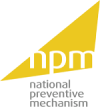Statement from the NPM on the Committee for the Prevention of Torture’s report on England
Statement from the UK NPM in response to the European Committee for the Prevention of Torture and Inhuman or Degrading Treatment or Punishment (CPT) report to the United Kingdom on their 2019 visit to England.
The UK’s National Preventive Mechanism (NPM) is a network of 21 independent monitoring bodies in England, Wales, Scotland and Northern Ireland whose role is to prevent ill-treatment in detention. The NPM was established in 2009 in accordance with the UK’s obligations under the Optional Protocol to the Convention Against Torture and Other Cruel, Inhuman or Degrading Treatment or Punishment (OPCAT).
Four NPM members have a statutory duty to monitor and inspect prisons and places of juvenile detention in England. These are: Her Majesty’s Inspectorate of Prisons for England and Wales (HMI Prisons), the Independent Monitoring Boards (IMB), Care Quality Commission (CQC), and Office for Standards in Education, Children’s Services and Skills (Ofsted). The Office of the Children’s Commissioner also has powers to visit places of detention where children are held.
The Council of Europe’s Committee for the Prevention of Torture (CPT) is an international body with a role to prevent ill-treatment through conducting visits to places of detention.
In May 2019 the CPT carried out a targeted follow-up visit to their previous visit to England in April 2016. The delegation visited HMP Doncaster, Liverpool and Wormwood Scrubs. They also visited three establishments in the youth secure estate, Feltham A and Cookham Wood Youth Offender Institutions (YOIs) and Rainsbrook Secure Training Centre (STC). During their visit, the delegation met with Her Majesty’s Chief Inspector of Prisons for England and Wales, the IMB National Chair and the Chair of the UK NPM.
The delegation paid attention to levels of violence in both types of detention facility and measures required to tackle violence in prisons. The CPT report also highlights concerns regarding detention regimes, use of force, segregation, means of restraint and health care.
The UK NPM welcomes the CPT’s comprehensive report (opens in a new tab). The NPM is committed to preventing torture and ill-treatment in its many forms and the relevant NPM bodies will consider the issues raised in the CPT’s report in their inspection and monitoring work.
We welcome also the CPT’s recommendation that UK authorities take such steps as may be necessary to ensure that the NPM is fully in compliance with OPCAT requirements.
Notes to editors
- The 21 bodies who make up the NPM are:
England and Wales
Care Inspectorate Wales; Care Quality Commission; The Children’s Commissioner for England; Her Majesty’s Inspectorate of Prisons; Her Majesty’s Inspectorate of Constabulary and Fire & Rescue Services; Healthcare Inspectorate Wales; Independent Monitoring Boards; Independent Custody Visiting Association; Lay Observers; Ofsted (Office for Standards in Education, Children’s Service and Skills)
Northern Ireland
Criminal Justice Inspection Northern Ireland; Independent Monitoring Boards (Northern Ireland); Northern Ireland Policing Board Independent Custody Visiting Scheme; The Regulation and Quality Improvement Authority
Scotland
Care Inspectorate; Her Majesty’s Inspectorate of Constabulary in Scotland; Her Majesty’s Inspectorate of Prisons for Scotland; Independent Custody Visiting Scotland; Mental Welfare Commission for Scotland; Scottish Human Rights Commission; United Kingdom; Independent Reviewer of Terrorism Legislation - CPT findings on specific areas regarding prisons can be found in the following: overcrowding, paragraphs 18 – 26; inter-prisoner, prisoner-on-staff and staff-on-prisoner violence, paragraphs 27 –39; issues with complaints processes and use of force recording, paragraphs 52 – 62; prolonged periods in segregation and poor regimes, paragraphs 89 – 93 (see paragraph 104 for discussion of segregation for those with mental health conditions); health care (incl. issues associated with beds in psychiatric hospitals, mental health, and self-harm & suicide), paragraphs 94 – 114.
- CPT findings on specific areas regarding YOIs and STC can be found in the following: ill-treatment and excessive use of force, paragraphs 116 – 117; violence, paragraphs 118 – 119; use of force, paragraphs 120 – 127 (Rainsbrook, violence and use of force, paragraphs 168 – 170); issues with regime and activities, paragraphs 128 – 135; segregation, paragraphs 146 – 154 (Rainsbrook, paragraphs 182 – 183); health care and mental health, paragraphs 155 – 163 (Rainsbrook, paragraphs
184 – 191).
